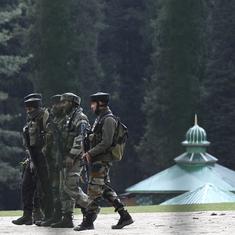In India, October 2 is celebrated every year as Gandhi Jayanti to celebrate Mahatma Gandhi’s birth anniversary. In 1969, Gandhi Centenary Year, I happened to be working as an agricultural volunteer based at a Gandhian ashram in Bodh Gaya – the birthplace of Buddhism – in Bihar.
This particular ashram had been founded by a dedicated follower of Gandhi, Vinoba Bhave and it was set up to study all religions. At the early morning prayers, we would have a reading from the Qur’an one day, the Bible the next, and then on successive days from the Gita, the Granth Sahib (holy book of the Sikh religion), the Torah (sacred to the Jewish people) and readings from Buddhist scriptures.
From this experience, I have absorbed some teachings of all religions and I try to follow what Gandhi used to say: “Let the doors and windows of my house be open and let all the religions of the world blow through my house.”
Friendship to all...
Although India was divided on religious grounds in 1947, it is very significant that, as an independent country, Bangladesh promised to uphold and promote secularism. Even before Victory Day on December 16, 1971, I remember Tajuddin, Bangladesh’s prime minister in exile, telling me in Kolkata that Bangladeshis of all faiths had suffered and fought in the Liberation War and so Bangladesh would be for all faiths. He further told me that Islam clearly teaches to have respect for all religions.
From the very beginning, Bangabandhu Sheikh Mujibur Rahman followed his, and now Bangladesh’s, foreign policy, guided by “friendship to all, malice towards none”, a very non-violent policy.
Gandhi is, of course, remembered for his marches and fasts for peace in both parts of Bengal when he spent many days trying to stop the communal killings in Noakhali and Kolkata in 1946, prior to the independence of India. Gandhi’s walks or “padyatras” for peace inspired Vinoba Bhave to walk all over India in the 1950s and 1960s persuading big landlords to donate land to the “bhoodan” (land gift) movement, the land then being distributed to the landless and the lowest caste communities.
Where a significant amount of land was donated in a village, it was declared “gramdan” or village gift, and so it was that the Oxfam Gramdan Action Program was initiated in 1968 in Bihar following the Bihar famine of 1966/1967 and this program was based on four Gandhian ashrams in Bihar.
When we had quarterly progress meetings of Oxfam Gramdan Action Program, occasionally Jayaprakash Narayan would attend both to inspire us and make sure we were on the right track. Later, of course, he strongly supported Bangladesh’s war of independence. Another Gandhian leader, who supported the formation of Bangladesh and Oxfam’s work with the refugees, was the late Narayan Desai whose father had been Gandhi’s secretary.
My life and work were definitely changed and benefitted by the influence of Gandhian thoughts and beliefs. And it was at the Samanvaya Ashram at Bodh Gaya that, as a young man of 23 years, I was influenced by the ashram leader, Dwarko Sundrani, who passed away last year at the age of 98 years. He was the last living disciple of Gandhi. He was very critical of the way in which Gandhi’s birthday is celebrated each year.
Gandhi’s principles
A year before his death, Dwarko said in an interview: “Celebrating Gandhi’s birth anniversary and then forgetting him till his next birthday is not a way to express our gratitude and respect for him.”
“We are not going to organise any event on Gandhi Jayanti this year, rather we will serve the helpless and needy people in the flood-stricken Bihar,” Dwarko said. “Why? Because this is what Gandhi would have done if he was alive.”
“Instead of celebrating Gandhi’s birth anniversary, we will be serving people,” he said. “What is the use of organising seminars and workshops and reading his autobiography if we do not implement the teachings of Gandhi in our daily lives?”
Although Bangabandhu’s life witnessed a great deal of violence and Bangladesh itself emerged after a bloody struggle, Bangabandhu certainly tried to follow Gandhi’s policy of non-violence during his life. Sadly, however, he and his family members experienced a most violent death.
Julian Francis has been associated with relief and development activities of Bangladesh since the War of Liberation.
This article first appeared in Dhaka Tribune.










